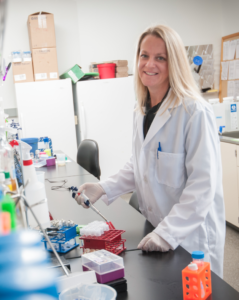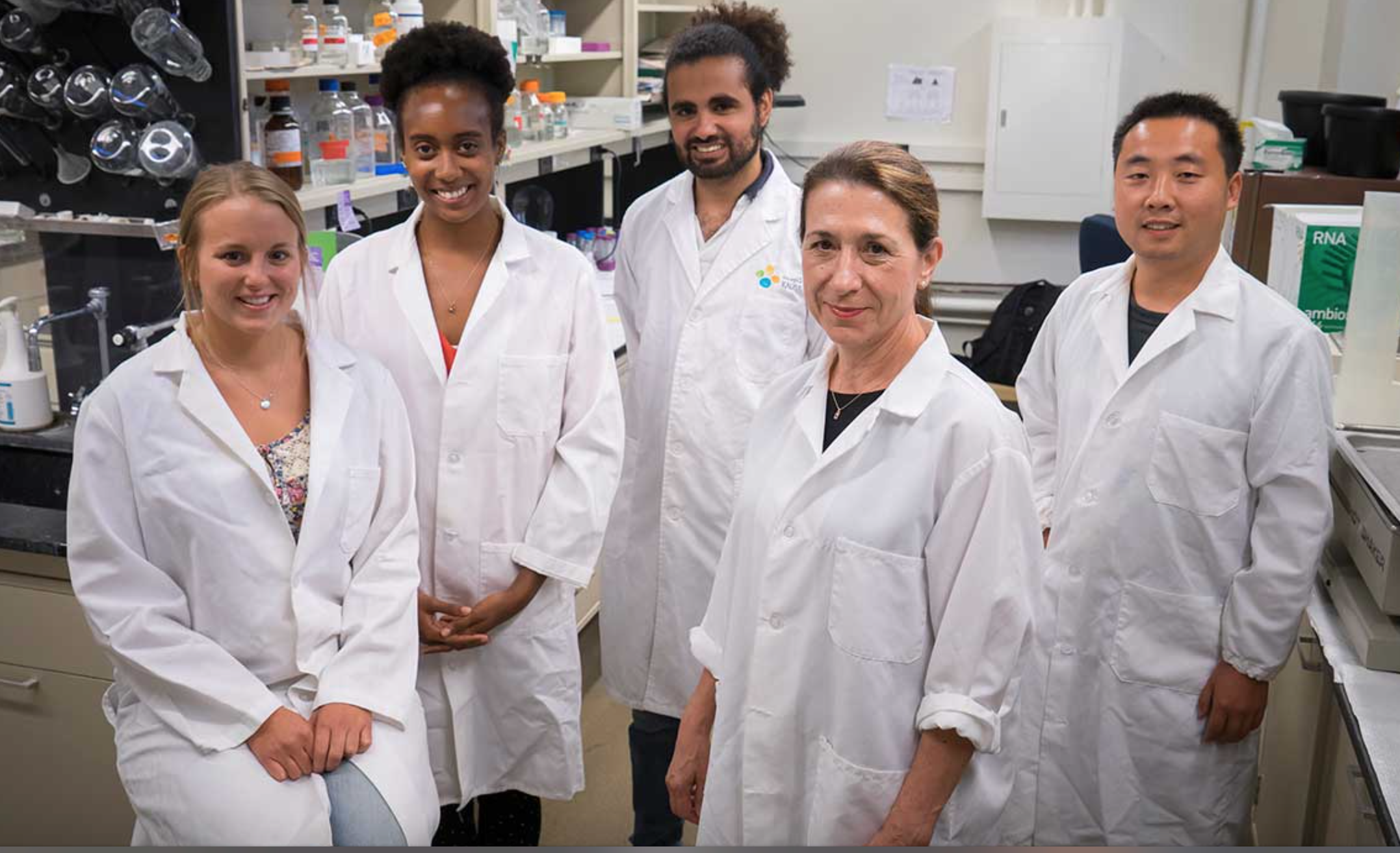Dec. 19, 2016:

Andrea L. Kasinski, PhD
Investigator Spotlight
Andrea L. Kasinski, PhD
Educational Background: PhD, Emory University (2009), Postdoctoral Fellow, Yale University
Research Interests: My laboratory works on non-coding RNA biology and therapeutics. Specifically, we focus on identifying biologically important RNAs whose misexpression drives the tumorigenic process. We then utilize this information to design, develop, and implement RNA-based therapeutics. Specifically, evidence-based approaches are being developed to identify microRNAs that drive the process of tumorigenesis, or to identify microRNAs that are required for tumor cell maintenance or therapeutic resistance. Using this data, we then develop various strategies to alter the concentration of theses microRNAs in vivo using either small molecule inhibitors, or novel targeting approaches that deliver microRNAs in the absence of toxic delivery vehicles. Our overarching goal is to generate substantial knowledge that will lead to the clinical utility of non-coding RNAs.
Fun Facts: I have a loving and supportive husband, Scott Haymond, and two incredible step-children, Abby and Parker.
Growing up in a traditional blue-collar family, I had little knowledge on what a PhD was. A great deal of my scientific success is due to the late Dr. Dean Danner at Emory University, a fantastic mentor that recognized my strengths and recommended that I pursue my doctorate.
Originally I wanted to be a cardiac transplant surgeon; however, after I got involved in research I recognized that my passion was in research and discovery.
Thought Leader Perspectives
This article is used by permission. See the original post at Purdue University: College of Veterinary Medicine
A research team in the department of Basic Medical Sciences (BMS) has identified a link between the hepatitis B virus (HBV) and the development of liver cancer. Dr. Ourania Andrisani, professor of Basic Medical Sciences, leads the team of graduate research assistants Ahmed Diab, Saravana Kailasam Mani, Dante’ Johnson and post-doctoral research associate Zhibin Cui, in collaboration with the research team of professor Philippe Merle from INSERM, France. Using molecular approaches including transfections, fluorescence-activated cell sorting, immunoblotting, and reverse transcription polymerase chain reactions (qRT-PCR), Dr. Andrisani’s team investigated the functional significance of epithelial cell adhesion molecule (EpCAM) re-expression in HBV-mediated cancer production in the liver.

Members of the BMS research team studying hepatitis B virus and liver cancer: (left-right) Ellen Weigel, 2nd year DVM student; Dante’ Johnson, student in the PREP program (Post-baccalaureate Research Education Program in the Biomedical Sciences); Ahmed Diab, PhD student; Dr. Ourania Andrisani, professor of Basic Medical Sciences; and Dr. Hao Zhang, former post-doctoral associate.
The role of EpCAM-regulated intramembrane proteolysis (RIP), which involves processing of EpCAM into smaller protein fragments or peptides, was investigated in HBV replicating cells in vitro and in liver tumors from chronically HBV infected patients. The results indicate that chronic infection by the hepatitis B virus triggers a molecular mechanism that results in the development of poor prognosis liver cancer. Based on this mechanism, the researchers’ results suggest a novel strategy of therapeutic intervention to hinder development of virus-induced liver cancer.
Dr. Andrisani and her team conducted the study in collaboration with the Purdue Center for Cancer Research, Purdue University Libraries, and the Centre de Recherche en Cancérologie de Lyon in France. The study was funded through grants from the National Institutes of Health and the Institute National du Cancer. The research and conclusions reached in the study were published in May in the Journal of Hepatology.
Writer: Kelsey Johnson, PVM Communications Intern, pvmnews@purdue.edu
About the Big Ten Cancer Research Consortium: The Big Ten Cancer Research Consortium was created in 2013 to transform the conduct of cancer research through collaborative, hypothesis-driven, highly translational oncology trials that leverage the scientific and clinical expertise of Big Ten universities. The goal of the Big Ten Cancer Research Consortium is to create a unique team-research culture to drive science rapidly from ideas to new approaches to cancer treatment. Within this innovative environment, today’s research leaders collaborate with and mentor the research leaders of tomorrow with the unified goal of improving the lives of all patients with cancer.
About the Big Ten Conference: The Big Ten Conference is an association of world-class universities whose member institutions share a common mission of research, graduate, professional and undergraduate teaching and public service. Founded in 1896, the Big Ten has sustained a comprehensive set of shared practices and policies that enforce the priority of academics in the lives of students competing in intercollegiate athletics and emphasize the values of integrity, fairness and competitiveness. The broad-based programs of the 14 Big Ten institutions will provide over $200 million in direct financial support to almost 9,500 students for more than 11,000 participation opportunities on 350 teams in 42 different sports. The Big Ten sponsors 28 official conference sports, 14 for men and 14 for women, including the addition of men’s ice hockey and men’s and women’s lacrosse since 2013. For more information, visit www.bigten.org.














Subscribe to the Big Ten CRC Newsletter X
X Facebook
Facebook YouTube
YouTube